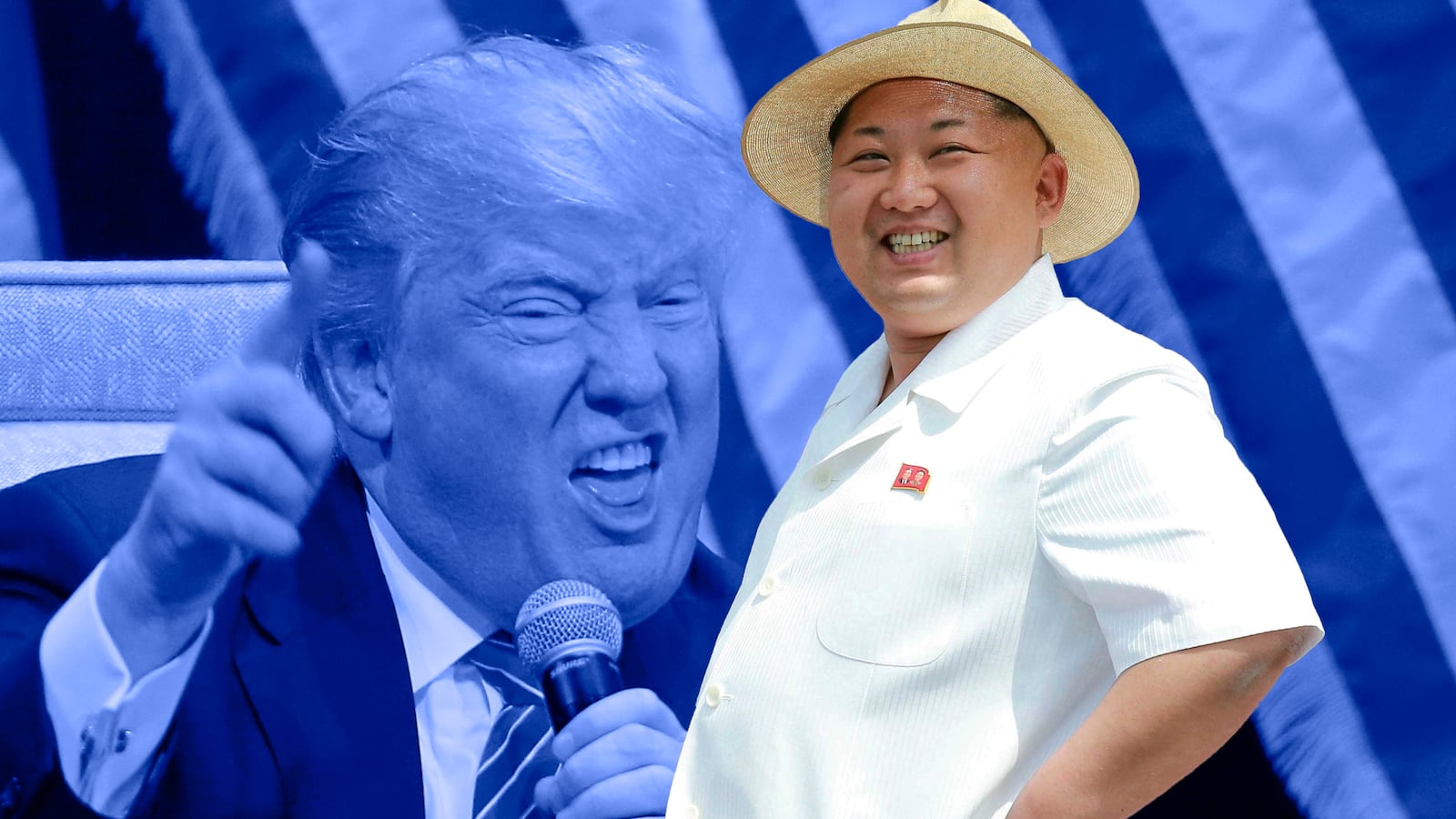North Korea has all but endorsed the presumptive Republican presidential nominee. “It turns out that Trump is not the rough-talking, screwy, ignorant candidate they say he is, but is actually a wise politician and prescient presidential candidate,” Han Yong Muk, labeled a China-based Korean scholar, wrote Tuesday in DPRK Today, a state media outlet.
After calling Trump’s presumptive opponent “thick-headed Hillary,” Han told American voters to cast their ballots for the real estate tycoon and former reality TV star.
The compliments are all the more remarkable in light of Trump’s advocacy of the assassination of Kim Jong Un, the North Korean leader and, in the Donald’s words, “a bad dude.”
Bad dude or not, Kim has thrown his considerable weight behind Trump, as has another authoritarian superstar, China’s Xi Jinping. Over the last several months, there has been what looks like a concerted Chinese campaign to elect the Republican. Trump “could in fact be the best president for China,” said Wu Jun, a commentator on Phoenix Television, at the end of April. Phoenix is a private station in Hong Kong that serves as a front for Beijing.
It was not long ago that Chinese state media was firing warnings in Trump’s direction. In February, after the Nevada caucus, the Ministry of Foreign Affairs told “the relevant candidate”—Trump—to behave “in a responsible manner.”
Trump, famously, has created his presidential brand by attacking Beijing, suggesting for instance a 45% tariff on goods from China. And from time to time his language has been incendiary. At the beginning of last month, for instance, he said “We can’t continue to allow China to rape our country, and that’s what they’re doing.”
So why have the political establishments in Pyongyang and Beijing decided to support the GOP candidate?
In the case of North Korea, the answer is clear. On March 29, the candidate expressed willingness to walk away from a decades-old alliance in East Asia. “We are better off frankly if South Korea is going to start protecting itself,” Trump told CNN’s Anderson Cooper. “They have to protect themselves or they have to pay us.”
For decades, North Korea, trying to unify Korea under Kim-family rule, has tried to break the relationship between Washington and Seoul. Tens of thousands of American military personnel stationed on the peninsula—and many more elsewhere—have defended the South Korean state every minute of every day, preventing an invasion like the one that started the Korean War in June 1950.
Even when South Korea was led by the left-leaning governments of Kim Dae Jung and Roh Moo-hyun, in the nineties and the first decade of this century, Pyongyang was unsuccessful in splitting Seoul from Washington. And during the current conservative administration of Park Geun-hye and that of her predecessor, Lee Myung-bak, the alliance has looked indestructible.
Pyongyang heard Trump’s comments to CNN and perceived an historic opportunity to take over, by intimidation or force, the southern half of the peninsula. Han Yong Muk specifically praised Trump for threatening to remove U.S. troops from Korean soil.
For China, the calculus appears to be much the same. Trump, in the Anderson Cooper interview, also suggested America consider ditching Japan, often called America’s cornerstone ally in Asia. “Japan is better if it protects itself against this maniac of North Korea,” he told the CNN anchor.
If Tokyo is left alone to protect itself against North Korea, then it will also be alone against China, which is currently using forceful tactics to pry away the Senkaku Islands in the East China Sea. Moreover, the Chinese have designs on the Ryukyu chain, which includes the strategically critical island of Okinawa.
Not surprisingly, the Chinese are getting excited. He Liangliang, a Phoenix Television anchor, on air at the beginning of last month said “It looks like Trump is God’s tool to end American imperialism.”
But while Beijing often calls America’s presence “imperialistic” or “hegemonic,” the countries on China’s periphery—and many farther afield—want U.S. forces to stay to guarantee the peace and stability that has allowed them and the rest of the world to prosper since the end of the Second World War.
History is often marked by stretches of decades, and sometimes centuries, of relative calm, interrupted by truly horrendous events. President Obama and Japanese Prime Minister Shinzo Abe remembered the end of the world’s last great tragedy with their solemn remarks in Hiroshima on Friday. That global conflict began with grabs of territory by aggressors who believed the Western democracies would not stand firm.
Trump, with his desire to end treaty alliances and withdraw from Asia, can start a chain of events leading to the next horrific period as new sets of ambitious leaders see opportunities to take reefs, shoals, islands, and land of their neighbors, unopposed by America.
No wonder Asian tyrants are endorsing Trump.






